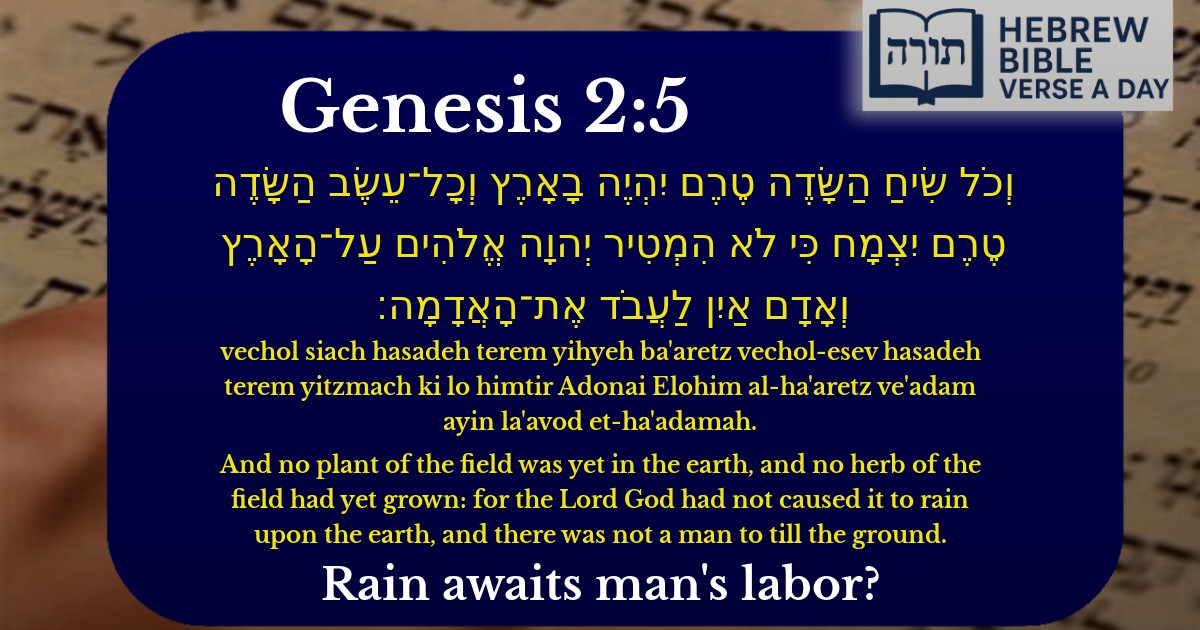Join Our Newsletter To Be Informed When New Videos Are Posted
Join the thousands of fellow Studends who rely on our videos to learn how to read the bible in Hebrew for free!
Hebrew Text
וְכֹל שִׂיחַ הַשָּׂדֶה טֶרֶם יִהְיֶה בָאָרֶץ וְכָל־עֵשֶׂב הַשָּׂדֶה טֶרֶם יִצְמָח כִּי לֹא הִמְטִיר יְהוָה אֱלֹהִים עַל־הָאָרֶץ וְאָדָם אַיִן לַעֲבֹד אֶת־הָאֲדָמָה׃
English Translation
And no plant of the field was yet in the earth, and no herb of the field had yet grown: for the Lord God had not caused it to rain upon the earth, and there was not a man to till the ground.
Transliteration
Vechol siach hasadeh terem yihyeh ba'aretz vechol-esev hasadeh terem yitzmach ki lo himtir Adonai Elohim al-ha'aretz ve'adam ayin la'avod et-ha'adamah.
Hebrew Leining Text
וְכֹ֣ל <b>׀</b> שִׂ֣יחַ הַשָּׂדֶ֗ה טֶ֚רֶם יִֽהְיֶ֣ה בָאָ֔רֶץ וְכׇל־עֵ֥שֶׂב הַשָּׂדֶ֖ה טֶ֣רֶם יִצְמָ֑ח כִּי֩ לֹ֨א הִמְטִ֜יר יְהֹוָ֤ה אֱלֹהִים֙ עַל־הָאָ֔רֶץ וְאָדָ֣ם אַ֔יִן לַֽעֲבֹ֖ד אֶת־הָֽאֲדָמָֽה׃
וְכֹ֣ל ׀ שִׂ֣יחַ הַשָּׂדֶ֗ה טֶ֚רֶם יִֽהְיֶ֣ה בָאָ֔רֶץ וְכׇל־עֵ֥שֶׂב הַשָּׂדֶ֖ה טֶ֣רֶם יִצְמָ֑ח כִּי֩ לֹ֨א הִמְטִ֜יר יְהֹוָ֤ה אֱלֹהִים֙ עַל־הָאָ֔רֶץ וְאָדָ֣ם אַ֔יִן לַֽעֲבֹ֖ד אֶת־הָֽאֲדָמָֽה׃
🎵 Listen to leining
Parasha Commentary
📚 Talmud Citations
This verse is quoted in the Talmud.
📖 Chullin 60b
The verse is referenced in a discussion about the creation of plants and the role of rain in their growth, highlighting the sequence of creation events.


Verse Context in Creation
The verse (Bereshit 2:5) describes the state of the world before the creation of man. Rashi explains that this passage comes to answer why Hashem created man—because there was no one to recognize the necessity of rain for vegetation. The Midrash (Bereshit Rabbah 13:3) elaborates that the plants were "awaiting" the prayers of Adam HaRishon, teaching that human involvement is essential for Divine blessings to manifest in the physical world.
The Absence of Rain
Ramban notes that the verse emphasizes Hashem withheld rain because "there was no man to work the soil." This implies a fundamental relationship between human labor and Divine providence: rain—a symbol of bracha (blessing)—only descends when humanity actively participates in cultivating the world. The Talmud (Chullin 60b) connects this idea to tefillah (prayer), suggesting that rain represents reciprocal Divine response to human spiritual and agricultural efforts.
Adam's Role as a Partner in Creation
Halachic and Philosophical Implications
Rambam (Hilchot Ta’anit 1:1-3) derives from this verse that rainfall is contingent on merit, linking agricultural success to collective righteousness. The Maharal (Gur Aryeh) expands this concept, stating that Adam’s absence symbolized a world lacking tikkun (rectification), as human action is required to draw down Divine abundance—a principle foundational to Jewish thought on free will and partnership with Hashem.